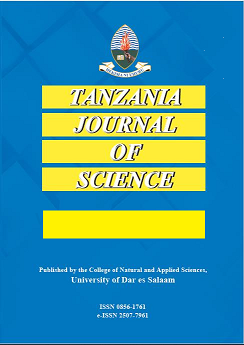Acute Toxicity Assessment of Centella asiatica and Bidens pilosa Aqueous Crude Leaf Extracts in Pregnant Rat Model
DOI:
https://doi.org/10.4314/tjs.v50i2.4Keywords:
Acute toxicity, Traditional medicine, Pregnant rat, Bidens pilosa, Centella asiaticaAbstract
There is little information on the safety of using traditional medicines during pregnancy. The current study assessed the safety of aqueous crude leaf extracts from two medicinal plants; Centella asiatica L. and Bidens pilosa L. in pregnant rats. Acute toxicity was evaluated by administering a single dose of plant extracts to pregnant rats at three standard doses of 1000, 2000 and 5000 mg/kg for 14 days. Distilled water was used as a negative control. Physiological and behavioural responses were assessed at 30 minutes, 1 hour, 4 hours, 12 hours and every other day until gestation day 22. The pregnant rats were humanely sacrificed at term after anaesthesia using CO2. Blood was collected for haematological analysis and tissues (liver, kidney and gravid uterus) were for histopathological examination. The findings showed that the plants extracts are non-toxic at low studied dose of 1000 mg/kg when taken only once. However, C. asiatica and B. pilosa aqueous crude leaf extracts at higher doses (5000 mg/kg) caused a significant increase (p < 0.05) of platelets, and biochemical parameters, Aspartate aminotransferase (AST) and Alanine aminotransferase (ALT) resulting in severe histopathological effects to the liver, kidney and gravid uterus. These findings provide baseline data on the safety of studied plant crude leaf extracts and exposure time to pregnant rats, as well as indications for future preclinical and clinical studies on the formulation of the plant extracts. Furthermore, the results give insights to the current users of the plant extracts to avoid their maximum consumption during pregnancy.


